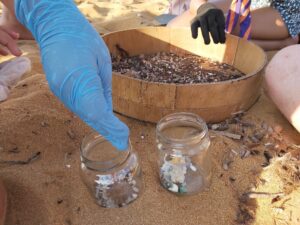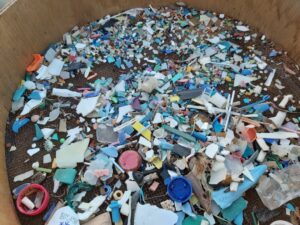BeMED 16. Outdoor Classroom Activity – Beach Fieldwork
Title |
Outdoor Classroom Activity – Beach Fieldwork |
Author |
Ramona Mercieca |
Age Guide |
Year 7 |
Subject Area |
Geography |
| Preparation Time | 1 hour |
| Estimated Duration | 4 hours |
| Site | Coastal Area |
| Educational objectives | To further students’ map reading skills.
To develop fieldwork skills such as collecting and recording data. To learn more about their local area and describe how litter make them feel. |
| Learning Outcomes | – I can use the basic mapping skills which include a scale, a legend and compass points to plan journeys, latitudes and longitudes to locate places.
– I can use appropriate sources to observe and record local weather. – I can justify the importance of identifying problems, reflecting critically, thinking creatively and having a wider vision in order to plan for the future and become an effective agent of change. – I can use the natural, social and built environment that surrounds me, as a context and source of learning. – I am motivated to make a positive contribution to other people and their social and natural environment, locally and globally. – I can reflect upon the consequences of my actions on present and future generations. |
| Link to SDGs | SDG 3: Good health and well-being
SDG 4: Quality education for all SDG 11: Sustainable cities and communities SDG 12: Responsible consumption and production |
| Educational resources required | A4 map of beach site x1 (per group)
Appendix 16.1 – Group Recording Sheets X5 (per group) Appendix 16.2 – Litter Survey Sheet x1 (per group) Pencils Clipboards Digital cameras Data logger Thermometer Digital pH reader GLOBE Observer App – optional Small container X1 (per group) |
| Remote preparation | Teacher needs to prepare the resources as indicated in the previous section.
The outdoor classroom activity will be an opportunity for students to apply the knowledge and skills learned during geography lessons like using a map, observing and recording the weather, locating beach site using the coordinates. Before the outdoor classroom activity the students will do research about marine litter – its sources and effects on the marine environment. |
| Planning Considerations | It is very important to focus on the FACTS, especially when researching and collecting data re marine litter.
Healthy and Safety information (stay in groups, stay away from the sea and cliffs, hazard of roads and weather). Brief outline of the day and objectives for the day. Set up the day’s investigation aim and consider hypotheses. Toilet stops and time for the lunch break. Risk assessment/class list/medication/first aid kits. |
| Method | Activity Outline: Half the day is spent at the beach collecting field data on weather, sea water temperature, sea water pH level and doing a litter survey.
Introduction Introduce site and locate it on the map of the Maltese Islands. Briefly introduce the history of the area (fishing and tourism and coastal erosion). The students will be split in groups and each group will select a leader and is given a pack with the group’s recording sheets and a small container. Development Students explore and investigate the beach site by answering the questions on the group recording sheets (Appendix 16.1). There are 5 sections which can be answered in no particular order: § Part 1: Students look around them and describe the situation on site. § Part 2: Students observe and record weather conditions. The teacher will be going around the students to assist with data collection (question c and d). § Part 3: Students measure sea water conditions with the help of the teacher. § Part 4: Students carry out a silence exercise.
Conclusion Staying in the same group, the students will be invited to carry out a litter survey and beach clean-up. Each group is given a litter survey data sheet (Appendix 16.2) and a garbage bag. All litter collected will be taken to school to be analyzed and weighed. |
| Follow-up activities | Analysing sand for micro-plastics (samples of sand collected will be analysed and micro-plastics found can be analysed at school in the science labs).
Weigh the litter collected and present litter data in graph format. Think of ways of how to reduce marine litter and be agents of change by proposing solutions. |
| Background information for educators | Download the GLOBE Observer App and create an account with the GLOBE Program: https://observer.globe.gov/
Video clip on Marine Litter: https://youtu.be/71f_uFm9S7g Marine litter and micro-plastics: |





